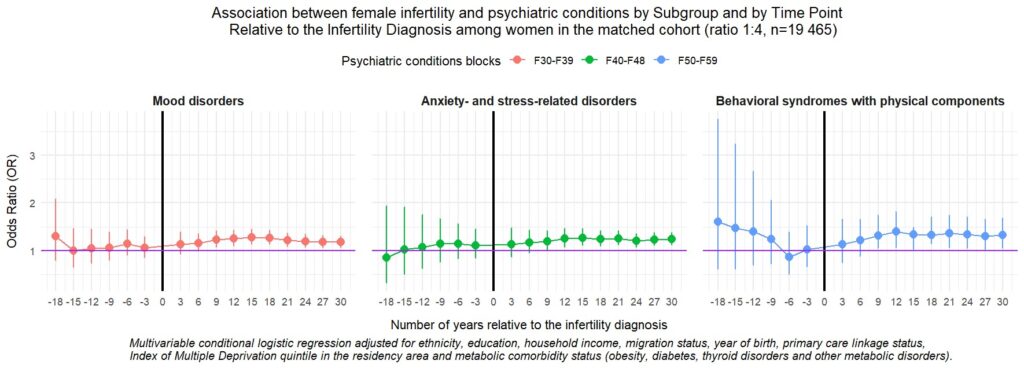Women’s Health
Infertility and Lifelong psychiatric disorders in Women: A Matched Cohort Study Linda Kahn* khaoula Ben Messaoud Nina Zaks
Research has demonstrated increased rates of anxiety and depression in females, particularly around the time of infertility diagnosis and treatment. Yet, gaps remain in the understanding of the relationships between female infertility (FI) and psychiatric health over longer time periods and across a broader range of psychiatric conditions. This study uses a matched-pair design (infertility +ve vs. -ve, ratio 1:4) within the UK Biobank cohort to examine the association between FI and psychiatric conditions by ICD-10 code blocks: mood disorders (F30-F39); anxiety- and stress-related disorders (F40-F48); and behavioral syndromes with physical components (F50-F59). We implemented multivariable conditional logistic regressions adjusted for socio-demographic variables and metabolic comorbidity. All associations were estimated overall and across different time points relative to the first diagnosis of FI (from 18 years prior to 30 years after, in 3-year intervals). We also tested the interactions between infertility diagnosis and (a) miscarriage and (b) live birth on psychiatric outcomes and performed sensitivity analyses parsing the sources of psychiatric outcome and infertility information (self-report, primary care, hospitalization). Findings show that infertility is significantly associated with a higher risk of all three psychiatric diagnosis groups (mood, anxiety- and stress-related, and behavioral disorders) overall and in almost all intervals starting nine years after diagnosis of infertility (Fig 1). We report a different trend in infertile females with an history of miscarriage prior the first FI diagnosis and live birth for all the outcomes. Our results are consistent across sources of psychiatric and infertility information. These findings show for the first time links between FI and psychiatric disorders beyond the care phase, emphasizing the critical need for long-term monitoring of psychiatric conditions in infertile women.

